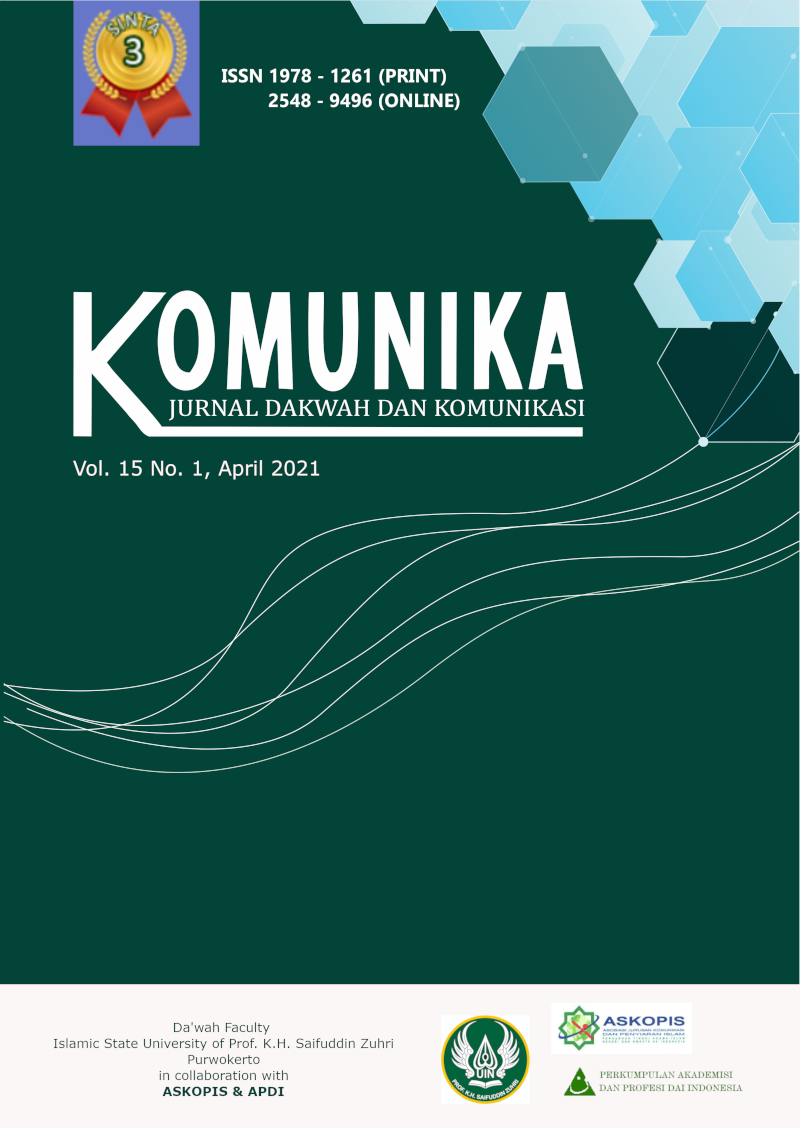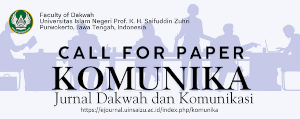Interreligious Relations in the Structural Da'wah Framework
A Historical Review of the Medina Charter, the 1945 Indonesian Constitution, and the Aceh Qanun No. 4 Year 2016
DOI:
https://doi.org/10.24090/komunika.v15i1.4544Keywords:
Medina Charter, The 1945 Indonesian Constitution, Aceh Qanun No. 4 of 2016, Structural da'wahAbstract
This paper examines the Medina Charter, the 1945 Constitution, and Aceh Qanun No. 4 of 2016 as a fundamental source of structural da'wah policies. Structural da'wah is a character of da'wah that involves the state directly in regulating policies related to the implementation of da'wah. The primary purpose of this research is to describe the role and position of the Medina Charter, the 1945 Indonesian Constitution, and Aceh Qanun No. 4 of 2016, being the basis for the implementation of structural da'wah and discussed the regulation about the inter-religious correlation in those three regulations. This research is qualitative research using the content analysis method. The results showed that the Medina Charter, the 1945 Indonesian Constitution, and Aceh Qanun No. 4 of 2016 is a state acknowledgment of the structural da'wah implementation in Aceh because the da'wah is under the direct control of the state or government. The Medina Charter, as a result of the Prophet's ijtihad, contains guidelines for inter-religious relations and the role of the state in regulating people's lives. The 1945 Constitution of Indonesia is the highest source of law in the Republic of Indonesia, which states the guarantees the independence of citizens to embrace religion according to their beliefs. While Aceh Qanun No. 4 contains the rules for spreading religion amid society.Downloads
Download data is not yet available.
References
Abdulrahman Abdulkadir Kurdi. (2002). Tatanan Sosial Islam. Yogyakarta: Pustaka Pelajar.
Bahtiar Effendy. (1999). Wawasan Alquran Tentang Masyarakat Madani: Menuju Terbentuknya Negara-Bangsa yang Modern, dalam Jurnal Pemikiran Islam Paramadina (Vol. 1). Jakarta: yayasan Paramadina.
Djam`an Satori, A. K. (2011). Metodologi Penelitian Kualitatif. Bandung: Alfabeta.
Homer Carey Hockett. (tt). Critical Method in Historical Research Writing. New York: Maccmillan Company.
Kawangung, Y. (2019). Religious moderation discourse in plurality of social harmony in Indonesia. International Journal of Social Sciences and Humanities, 3(1), 160-170.
Khaeriyah, H. (2018). Dakwah dalam Bingkai Politik. Tasamuh: Jurnal Studi Islam, 10(1), 31-64.
Khotimah, K., & Nurmahyati, S. (2020). Dakwah Transformatif Pondok Pesantren Miftahul Huda Kroya Dalam Membentuk Masyarakat Berperilaku Sosial Religius. KOMUNIKA: Jurnal Dakwah Dan Komunikasi, 14(2), 283-294.
Kuntarto, Widyaningsih, R., & Chamadi, M. R. (2021). The Hoax of SARA (Tribe, Religion, Race, and Intergroup) as a Threat to the Ideology of Pancasila Resilience. Jurnal Ilmiah Peuradeun, 9(2), 413-434. https://doi.org/10.26811/peuradeun.v9i2.
Louis Gottschalk. (1983). Mengerti Sejarah. Jakarta: UI Press.
M. Quraish Shihab. (2007). Tafsir Al-Mishbah (Vol. 13). Jakarta: Lentara Hati.
Maftuchah, F. (2015). Dialog Dan Toleransi (Sebuah Alternatif Dakwah Di Tengah Pluralitas Agama). KOMUNIKA: Jurnal Dakwah Dan Komunikasi, 9(1), 60-68.
Muhammad Husain Haekal. (2005). Sejarah Hidup Muhammad. Jakarta: Litera AntarNusa.
Munawir. (1990). Islam dan tata Negara: Ajaran, Sejarah dan Pemikirannya. Jakarta: UI Press.
Nurcholish Madjid. (2005). Doktrin dan Peradaban: Sebuah Telaah Kritis tentang Masalah Keimanan, Kemanusiaan, dan Kemoderenan. Jakarta: Penerbit Paramadina.
Nurcholish Madjid. (2007). Islam Universal. Yogyakarta: Pustaka Pelajar.
Robert N. Bellah. (1991). Beyond Belief. Berkeley: University of California Press.
Rusydi, I., & Zolehah, S. (2018). Makna Kerukunan Antar Umat Beragama Dalam Konteks Keislaman Dan Keindonesian. Al-Afkar, Journal For Islamic Studies, 1(1, January), 170-181.
Said Agil Husin Al Munawar. (2005). Fikih Hubungan Antar Agama. Jakarta: Ciputat Press.
Suharsimi Arikunto. (1992). Manajemen Penelitian. Jakarta: Rineka Cipta.
Suryan, S. (2017). Toleransi Antarumat Beragama: Perspektif Islam. Jurnal Ushuluddin, 23(2), 185-200.
Syahrin Harahap. (2014a). Metodologi Studi Tokoh dan Penulisan Biografi. Jakarta: Prenadamedia Group.
Syahrin Harahap. (2014b). Teologi Kerukunan. Jakarta: Prenada Media Group.
Syahrin Harahap. (2015). Islam dan Modernitas: Dari Teori Modernisasi Hingga Penegakan Kesalehan Modern. Jakarta: Prenada Media Group.
Syahruddin, S. (2020). Kontribusi Dakwah Struktural dan Dakwah Kultural dalam Pembangunan Kota Palopo. LENTERA, 4(1).
Wiranata, I. H., & Marzuki, M. (2018). Kerukunan Antarumat Beragama Sebagai Dasar City Branding Harmoni Kediri The Service City. Jurnal Ilmiah Pendidikan Pancasila Dan Kewarganegaraan, 3(1), 64-73.
Zainal Abidin Ahmad. (1973). Piagam Nabi Muhammad SAW: Konstitusi Negara Tertulis yang Pertama di Dunia. Jakarta: Bulan Bintang.
Djam`an Satori, A. K. (2011). Metodologi Penelitian Kualitatif. Bandung: Alfabeta.
Jailani, I. A. (2016). Piagam Madinah: Landasan Filosofis Konstitusi Negara Demokratis. Al-Daulah: Jurnal Hukum Dan Perundangan Islam, 6(2), 269-295.
Syahruddin, S. (2020). Kontribusi Dakwah Struktural dan Dakwah Kultural dalam Pembangunan Kota Palopo. LENTERA, 4(1).
Widyaningsih, R. (2019). Deteksi Dini Radikalisme. Unsoed Press.
Bahtiar Effendy. (1999). Wawasan Alquran Tentang Masyarakat Madani: Menuju Terbentuknya Negara-Bangsa yang Modern, dalam Jurnal Pemikiran Islam Paramadina (Vol. 1). Jakarta: yayasan Paramadina.
Djam`an Satori, A. K. (2011). Metodologi Penelitian Kualitatif. Bandung: Alfabeta.
Homer Carey Hockett. (tt). Critical Method in Historical Research Writing. New York: Maccmillan Company.
Kawangung, Y. (2019). Religious moderation discourse in plurality of social harmony in Indonesia. International Journal of Social Sciences and Humanities, 3(1), 160-170.
Khaeriyah, H. (2018). Dakwah dalam Bingkai Politik. Tasamuh: Jurnal Studi Islam, 10(1), 31-64.
Khotimah, K., & Nurmahyati, S. (2020). Dakwah Transformatif Pondok Pesantren Miftahul Huda Kroya Dalam Membentuk Masyarakat Berperilaku Sosial Religius. KOMUNIKA: Jurnal Dakwah Dan Komunikasi, 14(2), 283-294.
Kuntarto, Widyaningsih, R., & Chamadi, M. R. (2021). The Hoax of SARA (Tribe, Religion, Race, and Intergroup) as a Threat to the Ideology of Pancasila Resilience. Jurnal Ilmiah Peuradeun, 9(2), 413-434. https://doi.org/10.26811/peuradeun.v9i2.
Louis Gottschalk. (1983). Mengerti Sejarah. Jakarta: UI Press.
M. Quraish Shihab. (2007). Tafsir Al-Mishbah (Vol. 13). Jakarta: Lentara Hati.
Maftuchah, F. (2015). Dialog Dan Toleransi (Sebuah Alternatif Dakwah Di Tengah Pluralitas Agama). KOMUNIKA: Jurnal Dakwah Dan Komunikasi, 9(1), 60-68.
Muhammad Husain Haekal. (2005). Sejarah Hidup Muhammad. Jakarta: Litera AntarNusa.
Munawir. (1990). Islam dan tata Negara: Ajaran, Sejarah dan Pemikirannya. Jakarta: UI Press.
Nurcholish Madjid. (2005). Doktrin dan Peradaban: Sebuah Telaah Kritis tentang Masalah Keimanan, Kemanusiaan, dan Kemoderenan. Jakarta: Penerbit Paramadina.
Nurcholish Madjid. (2007). Islam Universal. Yogyakarta: Pustaka Pelajar.
Robert N. Bellah. (1991). Beyond Belief. Berkeley: University of California Press.
Rusydi, I., & Zolehah, S. (2018). Makna Kerukunan Antar Umat Beragama Dalam Konteks Keislaman Dan Keindonesian. Al-Afkar, Journal For Islamic Studies, 1(1, January), 170-181.
Said Agil Husin Al Munawar. (2005). Fikih Hubungan Antar Agama. Jakarta: Ciputat Press.
Suharsimi Arikunto. (1992). Manajemen Penelitian. Jakarta: Rineka Cipta.
Suryan, S. (2017). Toleransi Antarumat Beragama: Perspektif Islam. Jurnal Ushuluddin, 23(2), 185-200.
Syahrin Harahap. (2014a). Metodologi Studi Tokoh dan Penulisan Biografi. Jakarta: Prenadamedia Group.
Syahrin Harahap. (2014b). Teologi Kerukunan. Jakarta: Prenada Media Group.
Syahrin Harahap. (2015). Islam dan Modernitas: Dari Teori Modernisasi Hingga Penegakan Kesalehan Modern. Jakarta: Prenada Media Group.
Syahruddin, S. (2020). Kontribusi Dakwah Struktural dan Dakwah Kultural dalam Pembangunan Kota Palopo. LENTERA, 4(1).
Wiranata, I. H., & Marzuki, M. (2018). Kerukunan Antarumat Beragama Sebagai Dasar City Branding Harmoni Kediri The Service City. Jurnal Ilmiah Pendidikan Pancasila Dan Kewarganegaraan, 3(1), 64-73.
Zainal Abidin Ahmad. (1973). Piagam Nabi Muhammad SAW: Konstitusi Negara Tertulis yang Pertama di Dunia. Jakarta: Bulan Bintang.
Djam`an Satori, A. K. (2011). Metodologi Penelitian Kualitatif. Bandung: Alfabeta.
Jailani, I. A. (2016). Piagam Madinah: Landasan Filosofis Konstitusi Negara Demokratis. Al-Daulah: Jurnal Hukum Dan Perundangan Islam, 6(2), 269-295.
Syahruddin, S. (2020). Kontribusi Dakwah Struktural dan Dakwah Kultural dalam Pembangunan Kota Palopo. LENTERA, 4(1).
Widyaningsih, R. (2019). Deteksi Dini Radikalisme. Unsoed Press.
Downloads
Published
2021-06-30
Issue
Section
Articles
License
Authors who publish with this journal agree to the following terms:
- Authors retain copyright and grant the journal right of first publication with the work simultaneously licensed under a Creative Commons Attribution-ShareAlike 4.0 International License that allows others to share the work with an acknowledgement of the work's authorship and initial publication in this journal.
- Authors are able to enter into separate, additional contractual arrangements for the non-exclusive distribution of the journal's published version of the work (e.g., post it to an institutional repository or publish it in a book), with an acknowledgement of its initial publication in this journal.
- Authors are permitted and encouraged to post their work online (e.g., in institutional repositories or on their website) prior to and during the submission process, as it can lead to productive exchanges, as well as earlier and greater citation of published work (See The Effect of Open Access).

























